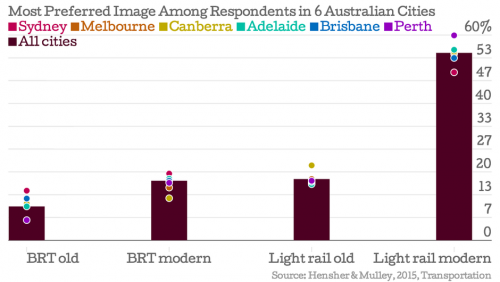Look closely. Which would you rather ride?
Transport scholars David Hensher and Corinne Mulley asked this question of residents of six cities in Australia. They included these ultra modern examples and also photographs featuring less modern trains and buses.
They found that people overwhelmingly preferred trains to buses, even though the modern bus has a dedicated lane just like the train and identical boarding and fare collection procedures.
We associate trains with romance and leisure travel or hip, urban places like Manhattan. In contrast, buses bring to mind traffic, exhaust, and being exhausted after getting off from a second job. Members of a focus group organized by the U.S. Department of Transportation, for example, had these things to say:
I’m ashamed to tell that I am taking buses…In Europe, I wouldn’t. But here, they would think, “Did he lose his job?”
The shame factor is majorly big.
I’m just saying that when I was in L.A. and I was in the car and just looking in at the bus…the people getting on….it just seems scary…
The bus has a bad rap.
But the authors found it wasn’t that simple. People from cities with better bus service tended to feel a little better about buses. If someone had recently had a good experience on a bus — like getting a seat for the whole trip — they felt better about buses. In fact, riding buses made people like buses more. People who rode more often had a better opinion.
Basically, give people good buses, good bus routes, and good service and they will come to love buses.
So, the authors argue that cities shouldn’t let the bad reputation of buses stop them from providing and improving bus service. Often buses are a better choice than trains. Bus routes are cheaper to get started and easier to change. High frequency and dedicated lanes can make them as efficient. So, if a bus is the right thing for the city, don’t give the people what they want, show them.
Lisa Wade, PhD is an Associate Professor at Tulane University. She is the author of American Hookup, a book about college sexual culture; a textbook about gender; and a forthcoming introductory text: Terrible Magnificent Sociology. You can follow her on Twitter and Instagram.


Comments 28
Bill R — March 10, 2015
I know many residents of NYC almost NEVER ride busses, primarily for three reasons:
1. They don't understand the routes and don't have the patience ti learn them like they learn the more permanent subways.
2. Experience with nasty bus drivers.
3. Experience, often when driving or walking the streets, with aggressive bus drivers...cutting people off, etc.
mimimur — March 10, 2015
It's not a zero sum game. Buses are cheap and flexible. Trains offer more space and have their own rails. In big cities with dense populations, the train is a faster way of transportation and keeps a big load off of already heavy traffic. They're also more comfortable if your commute is long. But in the suburbs and in smaller towns, the bus can take you almost door to door. And they don't all stop dead at the slightest provocation.
Changing the Bad Reputation of Buses - Treat Them Better — March 10, 2015
[…] Changing the Bad Reputation of Buses […]
physioproffe — March 10, 2015
For intercity travel, trains are a no brainer. But the intercity and commuter rail systems in the US are a fucken shitte hole compared to any European country. USA! USA! USA! Fucken joke.
physioproffe — March 10, 2015
Everything that normal decent human beings care about is demonstrably worse in the US than in other Western industrialized countries.
Chumbawumba — March 10, 2015
...Or they prefer trains to busses because busses have to content with car, truck, and bus traffic, where trains just have to deal with rail traffic. I'm one of those NYC residents who would rather walk than take a bus--because unless I'm going on a trek through the boroughs, I'm going to get there faster on foot.
Andrew — March 11, 2015
Some modern rapid-bus systems are among the most efficient and cost-effective mass transit networks in the world, and the ones I've taken have been no less comfortable or convenient than trains. Their users tend to be very happy with them. However, one big thing going against them is that their dedicated lanes and stations create huge, unsightly, and difficult-to-pass streets from the pedestrians' and drivers' perspectives. Underground subways are much more popular with non-transit users, even though they're far more expensive to build, because they're out of sight and don't interfere with other forms of traffic. I wonder if the same bias affects people's opinion of light-rail networks.
AML — March 11, 2015
I find it fascinating that there should be shame associated with bus-riding. In the UK, that is absolutely not the case. Here in London the bus infrastructure is pretty good and, whilst your journey may take longer due to traffic and speed restrictions, buses are often emptier and more pleasant than taking the tube or the overground rail.
Andy Whitten — March 11, 2015
"In fact, riding buses made people like buses more. People who rode more often had a better opinion."
This is a logical error. Correlation != causation.
Maybe the fact that people like the bus leads them to ride it more? Kinda like how people who like anchovies on their pizza tend to eat more pizza with anchovies?
Coco — March 11, 2015
I have lived for many years in Melbourne and have lived in Brisbane for the past ten years, and this article is very interesting.
In both cities, one ticketing system is used all all modes of transport. Price increases as zone are crossed, regardless of length of journey or mode.
In Brisbane, the rail infrastructure is poor, and the light rail system was ripped out in the 1960s. Buses service most areas, there are many dedicated bus lanes that are faster than car travel, the buses are clean, their 'brand' is quite well regarded, and so there is no stigma associated with using them. There are huge bus stations in the city and car parking available at many outer suburban bus stations.
In Melbourne the rail and light rail infrastructure (trains and trams) are excellent. The light rail (historic tramlines) service all of the inner, desirable suburbs. There are also many rail lines (trains) radiating out in all directions from the city and stations in every suburban business district. Light rail has a very desirable 'brand'. Properties within walking distance of light rail lines are valued higher than ones that are not. But the buses in Melbourne mainly just loop from outer suburban business centres and railways stations out to the further flung suburbs. Most people living there choose to drive 10 or 20 mins and park at the nearest railway station to go in to the city, rather than take the bus on a 30 minute circuitous route through outer suburbs before they even get on the train. These buses are mostly used by people that do not drive a car. Most Melbourne buses do not go to inner suburbs, there are very few express services and there are no city bus stops. There is no 'brand' on these buses. There is huge stigma. An inner suburban dweller can choose to act more sustainably by using light rail instead of car and will arrive quickly and avoid any parking hassles. An outer suburban dweller who chooses to catch a bus instead of driving will probably have a much longer and slower journey, not commensurate with distance traveled.
The culture of the cities has shaped our public transportation systems so much and the public transport systems we live with continue to shape the city and suburbs.
Rail and light rail are far superior to buses in my opinion. Buses are smelly and seem to collide with pedestrians and cyclists way more often than vehicles that just stay on tracks. Bus stations are ugly and intrusive. But I can see pros and cons with all modes.
Recently, a new service has come on to the market in Melbourne. Private luxury coach buses that pick up workers at a few outer suburban locations at peak travel times and take them into the city express, using the taxi/limousine lanes to beat the car traffic. There is no stigma with these, as they are luxurious and expensive and comfortable, and everybody on the bus is going to their full time city job. This service is not accessible to random users at all and so the service is exclusive rather than public.
It seems to me that stigma in these cities is associated more with the routes of travel (circuitous or direct) and time length of journey than the transport mode, and this leads to association between stigma and the mode used in a particular place. Better public transport makes places more desirable as it shortens commute time. Long commutes have stigma as they reduce a person's leisure time and productive time.
Yrro Simyarin — March 12, 2015
What is interesting to me is how the dislike of busses extends to both liberals and conservatives. Conservatives because of their dislike of public transportation in general, and liberals because trains are somehow more exciting? I have seen so many plans to build huge, expensive train networks servicing few areas, when that same money could quadruple the bus service.
ResaR — March 12, 2015
I would like to add that the positive association with trains also might come from the fact that they are usually larger, provide more space and seats for passengers, are more steady when they move, their routes take fewer turns, they are less noisy inside and they don't leave you in a cloud of smelly fumes when they pass by you.
Frances Woolley — March 14, 2015
You're absolutely right about the relative social status of buses and trains - I talk about some of these issues in this post about riding the loser cruiser: http://worthwhile.typepad.com/worthwhile_canadian_initi/2011/05/riding-the-loser-cruiser.html .
One point about the UK - the buses there are privatized. Privatization tends to lower wages, and thus makes it small buses that run frequently relatively more cost-effective. A small bus that runs frequently will be faster than a large bus that runs less often, and shorter travel times will get people on buses. Also in the UK pensioners get free bus travel, which effectively is a massive subsidy to buses (again, allowing for more frequent buses and nicer ones). Middle-class pensioners also change the social status of buses. Plus the urban geography of the UK is very different from that of the US.
Weird Al summed it up best, though: https://www.youtube.com/watch?v=JmEEnWEaeRk
Lauren Greene — June 8, 2019
Buses mean air pollution and no one wants to be associated with THAT!
lisa — March 26, 2022
Thanks for Sharing.i agree with your points calculating the cost of auto transport quote is the easiest and fastest way to find a company that works for you. Prefer that company who provides a cost calculator before shipping.maldives speed boats
Andrew Connell — April 28, 2023
Found your post interesting to read. Thanks for sharing this article.